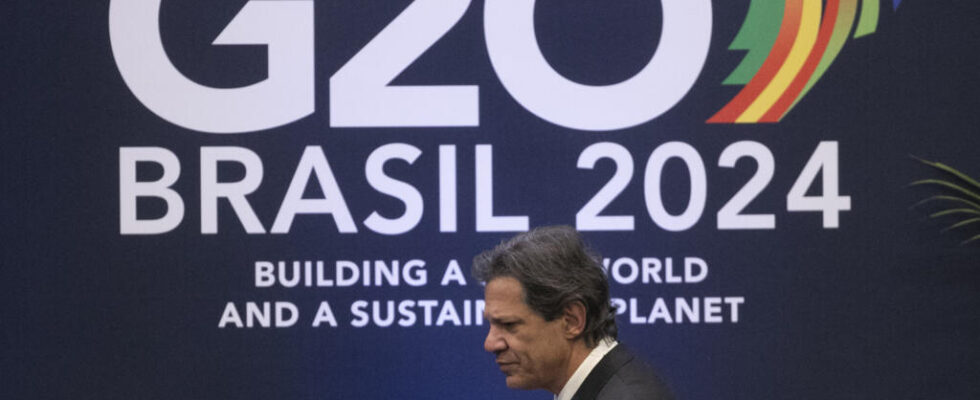What to do about the super-rich who largely evade taxes? The G20 finance ministers, meeting in Rio de Janeiro for two days, committed to ” cooperate ” to tax the super-rich.
4 mins
G20 countries commit to ” cooperate ” so that the wealthiest people are taxed more, but without going so far as to agree on a global tax, according to a declaration adopted on Friday July 26 after a meeting of finance ministers in Rio de Janeiro.
” In full respect of fiscal sovereignty, we will endeavour to cooperate to ensure that very wealthy individuals are effectively taxed. “, is written in this statement published by the Brazilian presidency of the G20.
The subject of billionaire taxation dominated the meeting that opened Thursday in Rio de Janeiro. Brazil under the left-wing president Luiz Inacio Lula da Silvawho is leading the body this year, is pushing for a minimum tax on the wealthy. A compromise solution could be to call on countries to toughen up their taxation of the super-rich, in the absence of an agreement on internationally coordinated taxation.
Read alsoTaxing the super rich: the idea is gaining ground at the G20
First step
The final statement, released on Friday, is expected to mark a ” first step ” on international tax cooperation, said Brazilian Finance Minister Fernando Haddad on Thursday evening. Without having reached a consensus on the establishment of a minimum tax on the wealthiest coordinated between countries, due in particular to a refusal by the United States, the minister had affirmed that this text will take up the ” Brazilian proposal to start looking at international taxation, not only from the perspective of companies, but also from the perspective of so-called super rich individuals ” This advance represents, according to him, a ” conquest of moral nature ” at a time when inequalities are growing and billionaires have never been so numerous and wealthy.
There FranceSpain and South Africa (which will chair the G20 in 2025) support this tax, which would not affect those who already pay 2% tax.
IMF chief welcomes G20 stance on ‘tax justice’ The G20 Ministers’ shared vision on progressive taxation is timely and welcome, as the need to rebuild fiscal buffers while addressing social and development needs involves difficult decisions in many countries. “, Kristalina Georgieva said in a statement. According to her, ” Promoting tax justice contributes to the social acceptance of these decisions “.
” Go further »
” It’s time to go further now “, reacted the American Nobel Prize winner in economics Joseph Stiglitz on Friday, calling for heads of state and government to give a mandate by November for coordinated minimum standards. The climate crisis is expected to cost trillions of dollars each year and it is outrageous to expect ordinary taxpayers to pay for it while the super rich escape taxes. “, said Camila Jardim, international policy specialist at Greenpeace, renewing the NGO’s call for a global tax. The road ahead is still long, as any cooperation between states on taxation is difficult by nature, as the latter are jealous of their fiscal sovereignty.
A partnership in climate protection
On the sidelines of this intense discussion, US Treasury Secretary Janet Yellen and Brazilian Economy Minister Fernando Haddad announced on Friday the signing of a partnership on climate protection. It is based on four pillars: clean energy supply chains, carbon markets, and transparent ” And ” regulated “, preservation of nature through public and private financing and multilateral climate funds.
While the G20 is hampered by divisions between Western countries and Russia – also a member of the group – since the beginning of the war in Ukrainedrafting a joint statement remained a challenge.
Brasília achieved its goal with the publication of three texts: a ” statement » specific on the « international cooperation in tax matters “, a broader final communiqué and a document published separately by the Brazilian presidency, which alone mentions the geopolitical crises. The final communiqué signed by all countries makes no mention of the wars in Ukraine and Gaza, but simply refers to the ” wars and escalation of conflicts ” as risk factors for the global economy. The statement signed by the Brazilian presidency, for its part, reports that some countries ” expressed their views on Russia and Ukraine and the situation in Gaza “.
Read alsoBrazil wants to make the fight against hunger a priority of the G20
